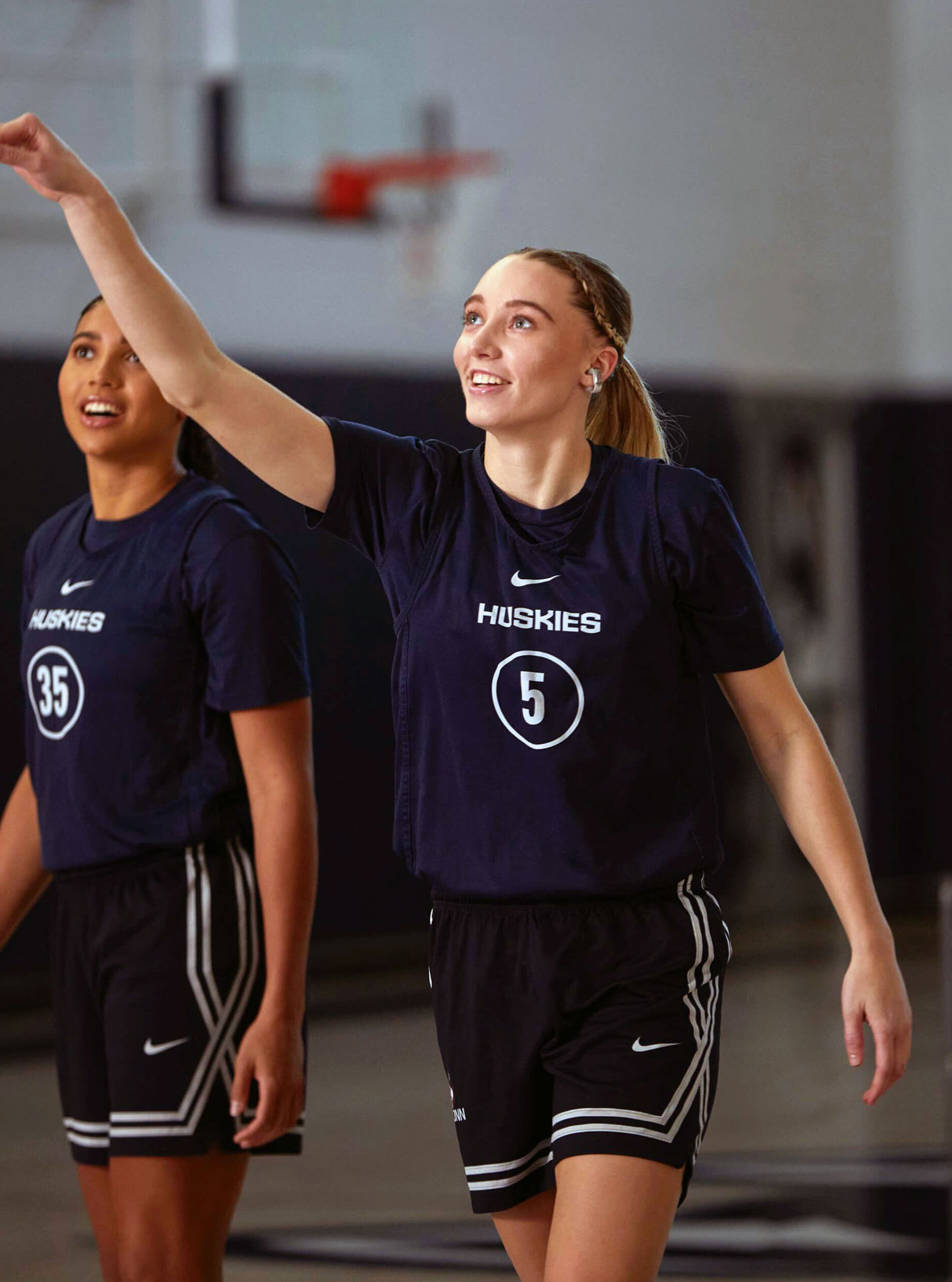Paige Bueckers AI Photos: What's Trending & Why?
In a world increasingly dominated by digital manipulation and the rapid spread of information, can we truly safeguard the privacy and dignity of public figures? The recent surfacing of explicit AI-generated photos of Paige Bueckers and Caitlin Clark serves as a stark reminder of the vulnerabilities faced by individuals in the public eye, demanding a critical examination of our online behaviors and the ethics of artificial intelligence.
The past week has been marked by a disturbing trend on social media. Doctored images of UConn's Paige Bueckers and former Iowa sensation Caitlin Clark, were circulated widely, bringing forth a wave of condemnation and highlighting the darker aspects of the digital age. The unauthorized use of their likenesses in sexually suggestive content, generated through artificial intelligence, has sparked widespread concern. This incident follows the release of AI-generated content, prompting urgent discussions about consent, privacy, and the potential for misuse of technology. The ease with which these fabricated images were created and disseminated underscores the need for more robust safeguards and a collective effort to combat the spread of misinformation and harmful content online.
| Category | Details |
|---|---|
| Full Name | Paige Marie Bueckers |
| Date of Birth | October 20, 2001 |
| Place of Birth | Edina, Minnesota, U.S. |
| Nationality | American |
| Height | 6 ft 0 in (1.83 m) |
| Position | Guard |
| High School | Hopkins High School (Minnetonka, Minnesota) |
| College | University of Connecticut (20202024) |
| Current Team | Dallas Wings (WNBA) |
| Awards and Honors |
|
| Professional Career Highlights | Selected in the 2024 WNBA Draft. |
| Reference | WNBA Official Player Profile |
The implications of these events extend beyond the immediate individuals targeted. The spread of AI-generated content, especially when it is malicious or sexually explicit, threatens the foundations of trust and authenticity in the digital sphere. The ease with which such images can be created and shared underscores a significant problem in the digital age, wherein it is difficult to distinguish between reality and artifice. The incidents also bring into sharp focus the ethical responsibilities of social media platforms and content creators to ensure the safety and dignity of their users.
Social media platforms, which serve as the primary channels for the spread of these fabricated images, face mounting pressure to take more decisive action. The lack of adequate content moderation and the insufficient enforcement of existing guidelines have turned these platforms into breeding grounds for abuse and exploitation. The situation calls for improved algorithms capable of swiftly detecting and removing AI-generated content that violates privacy or promotes harmful narratives.
The concept of consent is central to this issue. The creation of images without the express consent of the individuals depicted is a violation of their rights and a breach of ethical norms. The ability to generate realistic images of individuals without their permission undermines the fundamental principles of personal autonomy. The prevalence of such behavior reveals a disturbing disregard for the boundaries of privacy in the digital age. The incident should remind everyone of the crucial need to respect the consent of individuals and to value their privacy.
The reactions to the controversy have been varied, with many expressing outrage and concern. Angel Reese, former LSU Tigers star and Chicago Sky forward, made a plea regarding the topic, indirectly defending Clark and Bueckers, while many fans, athletes, and commentators have spoken out in support of the two athletes and condemning the actions of those who created and shared the images. The strong response emphasizes the importance of defending individuals against digital attacks.
The media outlets, including pornographic websites such as "star x video" and "xvideos," have also been implicated in the controversy, either through the hosting of fabricated content or by capitalizing on the interest generated by the scandal. The incident highlights the business aspect of online exploitation and the need for stricter regulations to prevent the spread of illegal and harmful content. The actions of such platforms, which may be more interested in views and clicks than in upholding ethical standards, require closer examination and the introduction of penalties.
The ethical and legal frameworks regulating the use of AI-generated content must be strengthened to account for the growing dangers. This includes clarifying consent requirements, increasing the penalties for the production and distribution of non-consensual intimate images, and developing industry-wide standards for the ethical use of AI. Legislators and policymakers must collaborate with tech companies, legal experts, and privacy advocates to create comprehensive solutions that safeguard individuals from the dangers of digital manipulation.
This is not the first time in the era of online content that these kinds of issues have emerged. In a time when information moves with incredible speed, the boundaries between truth and fiction have become increasingly blurred. The incident serves as a crucial reminder of the importance of media literacy and critical thinking skills. It emphasizes the necessity to think critically about all that is presented online and to verify the origin and credibility of any content before sharing it.
The popularity of Paige Bueckers and Caitlin Clark, who are not only accomplished athletes but also prominent public figures, makes them especially vulnerable. Bueckers, born on October 20, 2001, in Edina, Minnesota, and a point guard for the Hopkins High School team in Minnesota. She has been a key figure in the college basketball world, while Caitlin Clark, with her impressive achievements, is becoming a household name. The attention that these athletes receive, along with the increased risk of exploitation and manipulation, highlights the significance of this issue.
The situation serves as a wake-up call, motivating society to reconsider its attitudes toward privacy, consent, and the ethics of technology. It compels us to consider how we interact with information in the digital age, calling for a collective commitment to creating a safer, more respectful online environment. By confronting the problem of AI-generated images and other forms of digital manipulation, we can take a step toward protecting the rights and dignity of all people, both online and off. This is a chance to foster a digital environment that is based on integrity, responsibility, and respect, as opposed to one in which the boundaries of privacy are eroded.
The incident also brings attention to the need for stronger legal safeguards against the distribution of non-consensual intimate images. The present laws in many countries may not completely address the complexities of AI-generated content, particularly when it is employed for malicious purposes. Regulations must be revised and adapted to address the specific challenges presented by this technology. Stricter penalties for producing and circulating deepfakes or other forms of unauthorized content are required to discourage such activities.
The sports community, including fellow athletes, coaches, and organizations, must actively support Bueckers and Clark. This may involve issuing public statements of support, sharing information about online safety and reporting inappropriate content, and assisting in raising awareness about the risks of digital manipulation. The athletes' colleagues are in a good position to provide support and encouragement, as well as to advocate for policies that promote their safety and well-being.
In addition to the immediate reactions to the AI-generated images, discussions on the possibility of Playboy offering Bueckers and Clark "significant amounts of money for nudes" show the complexities of the situation. This raises important questions about the limits of exploitation, consent, and the economic incentives at play in the entertainment and media industries. Public personalities must be afforded the respect and protection they deserve, regardless of whether they have chosen to participate in the commercialization of their image.
The spread of such explicit and fabricated content has sparked concerns regarding the exploitation of women in sports and the pervasive issue of online harassment. The incident acts as a reminder of the persistent challenges women in the public eye face, including the sexualization of their bodies and the ongoing threat of online abuse. It calls for a reevaluation of the cultural attitudes that fuel such behavior and a commitment to developing a more respectful environment.
The ongoing issue of AI-generated content necessitates the cooperation of many stakeholders, including technology companies, lawmakers, the media, and the public. It calls for a multifaceted strategy that includes technological solutions, legislative reforms, educational campaigns, and a cultural shift toward greater respect for privacy and consent. Only through a concerted effort can we hope to safeguard the rights and dignity of people in the digital age.



